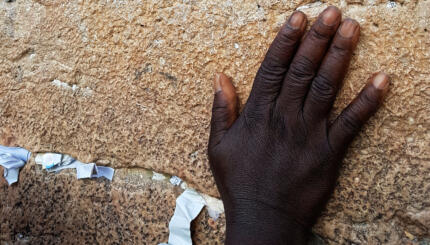This question does not occur to everyone. Some people know that they were meant to be Jews since childhood. Some people enter a synagogue and feel completely at home. Some people walk into the mikveh [ritual bath, which one immerses in as part of the conversion process] without a single doubt or regret.
On the other hand, if the question is pressing upon you and something in your heart says “No,” listen. That is your answer — at least for now.
Sitting on the Fence Is Normal
But for many people, the answer is not yes or no but “maybe.” This puts you in an awkward spot — one foot in, one foot out. It’s not a comfortable position, but it’s completely normal and not a sign that you lack commitment or that Judaism is wrong for you. The fact is, you may never feel completely, utterly, confidently ready to become a Jew. “Maybe” may be as close you get. There is no external measure or sign, no report card, no blinding flash of light from on high to assure you that you’ve mastered the material and the time has come.
And yet, at some point your rabbi will say, “I think you are ready.” Which places you squarely on a platform facing a leap of faith.

Help us keep Jewish knowledge accessible to millions of people around the world.
Your donation to My Jewish Learning fuels endless journeys of Jewish discovery. With your help, My Jewish Learning can continue to provide nonstop opportunities for learning, connection and growth.
You may have been up here before. People get married without being 100 percent certain of what marriage is going to be like. Nobody who becomes a parent for the first time has any idea of how much a baby will change his or her life. All of life’s major decisions are risky, dangerous, exhilarating.
The reasons for making any choice this big are never entirely cerebral. You choose Judaism because of the way your child loves Sunday school, because you’ve come to experience anti-Semitic remarks as personal attacks, because you love Mel Brooks, because of your relationship with your rabbi, because of the conversation at the Passover seder. Because it feels right.
Something May Make the Crucial Connection
Sometimes, there is an epiphany. Your rabbi might tell you that you’ll be ready when you hear yourself say “us” instead of “them,” “we” instead of “you.” (This does not mean that you’ve made a terrible mistake when someday, inevitably, you slip and say “them” when you meant “us.” It happens.) One woman tells a story about jogging past a man reading a Hebrew book. She slowed down, realizing that she shared something important with this total stranger. “Shalom,” she said. He smiled and said, “Shalom.” The next day she called her rabbi to schedule her conversion.
For another convert, the connection was made during a visit to Yad Vashem, the Holocaust memorial in Jerusalem.
Another man realized he was ready when he got into a heated argument about synagogue politics with a member of his congregation.
Not everyone experiences a dramatic moment of recognition. For many, the decision comes under pressure from an important deadline: a wedding, the birth of a baby, a bat mitzvah. In order to fully participate in the lifecycle event before you, you need to be Jewish. And that makes you ready enough.
You will not know everything you think you ought to know about Judaism, but you will know enough. You will not understand everything you think you need to understand about being a Jew, but you will understand enough. The rituals and ceremonies that mark your conversion are like a wedding, which does not celebrate the end of your engagement. A conversion, like a wedding, is just the beginning.
Excerpted with permission from Choosing a Jewish Life: A Handbook for People Converting to Judaism and for Their Family and Friends (Schocken Books).


